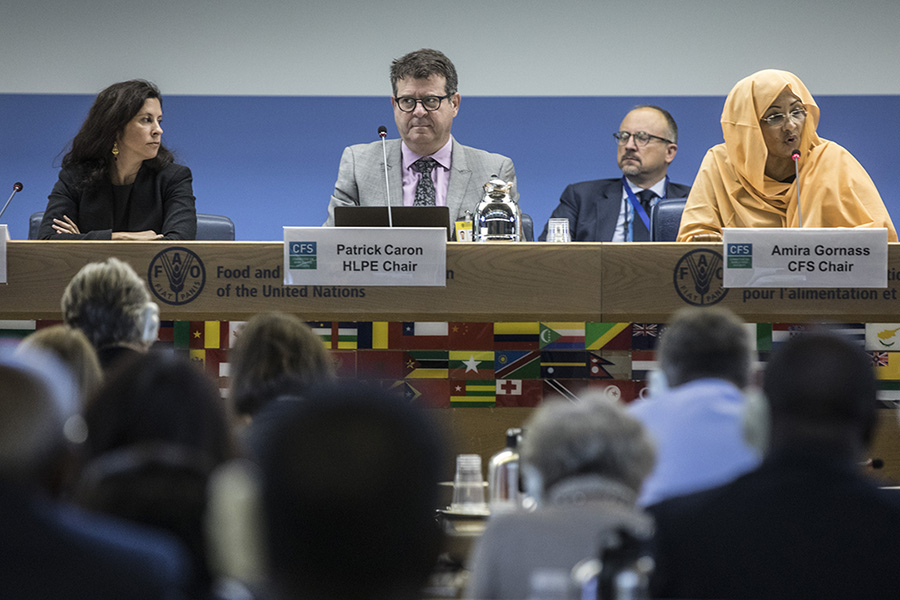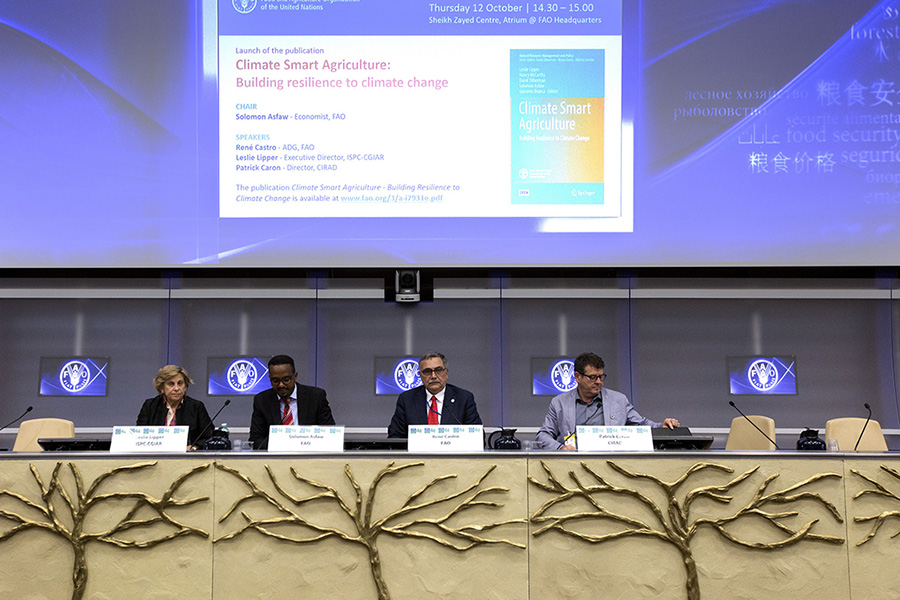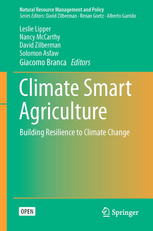9-13 October 2017. Rome. The Committee on World Food Security (CFS). The week-long, 44th Session of the Committee on World Food Security (CFS) – Making a Difference in Food Security and Nutrition – endorsed new recommendations on the role of sustainable forestry in achieving food security and nutrition for all.
The recommendations centred on the need for an integrated policy approach to forestry, agriculture, water and food security and nutrition by reinforcing cross-sectoral coordination.
 |
| Patrick Caron, HLPE Chair |
Tenure of land and other resources were also highlighted as key in the recommended approach, with the Committee acknowledging the greater role that the CFS Voluntary Guidelines on Tenure could play.
CFS also discussed urbanization and rural development, and offered a platform for stakeholders to work together and steer away from approaching urbanization and rural development as separate sectors as has been the case in the recent past. This is especially pertinent in a context of an increasingly urbanized world and changing food systems. The number of people living in cities is to rise from 50 percent to 66 percent by 2050.
Over the next two years, the Committee will explore the impact of urbanization on people with lower income and on furthering youth’s and women’s engagement and employment in food systems, including linking producers to markets.
Rural Youth Employment and Entrepreneurship for Food and Nutrition Security. From the G20-Summit to the EU-Africa Summit
Organisers: EU Commission – DEVCO + German Federal Ministry for Economic Cooperation and Development (BMZ) – Germany
Attractive employment opportunities for young people are often limited in rural areas. The event considered the momentum for rural youth employment related to the G20 Summit (July 2017 in Hamburg) and EU-Africa Summit (November 2017 in Abijan). The theme of employment creation in food systems will run throughout the event.
Unravelling the Food-Health Nexus. Addressing practices, political economy and power relations to build healthier food systems
Organisers: International Panel of Experts on Sustainable Food Systems (IPES-Food), Global Alliance for the Future of Food (GA)
Multi-stakeholder action to promote food diversity from farm to plate
Organisers: International Institute for Environment & Development, Hivos, UN Environment and Zambian Embassy in Rome
Forests, trees and agroforestry for food security and nutrition and the SDGs: research and partners, towards a joint action agenda.
Organisers: CGIAR program on Forests, Trees and Agroforestry (FTA), FAO, The Netherlands, Tropenbos Intl. and SIANI
The side event discussed expectations of stakeholders, from generating technical, policy and governance solutions, to scaling-up according to contexts. This will help defining priorities of research for development and of national and international partners, in support of stakeholders needs to implement the CFS action agenda.
Applying the VGGT in agribusiness investment projects: learning from LEGEND and other responsible investment pilots
Organisers: LEGEND – DFID Land Governance Support Programme
Mainstreaming Agrobiodiversity in Sustainable Food Systems: Scientific foundations for an Agrobiodiversity IndexOrganisers: Bioversity International, EC DEVCO, Italy, Syngenta, UN Standing Committee on Nutrition
An Agrobiodiversity Index, developed by Bioversity International with partners, based on the scientific evidence outlined in this book, will help policymakers and the private sector assess dimensions of agrobiodiversity to guide investments for sustainable food systems.
The potential of migration for Food Security and Nutrition
Organisers: Permanent Representation of Italy to the RBAs. FAO. ECDPM. Action Aid Italy
Climate Smart Agriculture – Building Resilience to Climate Change
Organisers: Climate-Smart Agriculture, FAO
 A new book publication, entitled ‘Climate-Smart Agriculture – Building Resilience to Climate change’, which is co-published by the Springer and FAO, was launched at the event.
A new book publication, entitled ‘Climate-Smart Agriculture – Building Resilience to Climate change’, which is co-published by the Springer and FAO, was launched at the event. 
Strengthening Smallholder Seed Enterprises for Food, Nutrition and Income Security
Organisers: Gorta-Self Help Africa. Irish Aid. Bioversity International. FAO
Promoting the growth and development of smallholder seed enterprises in Africa: what are the key factors.
Agribusiness Mega-Mergers’ Threat to World Food Security
Organisers: Civil Society Mechanism for relations with CFS
Source: PAEPARD FEED
by secretary
by secretary
by secretary
by secretary
by secretary
by secretary
by secretary
by secretary
by secretary
by secretary
by secretary
by secretary
by secretary
by secretary
by secretary
by secretary
by secretary
by secretary
by secretary
by secretary
by secretary
by secretary
by secretary
by secretary
by secretary
by secretary
by secretary
by secretary
by secretary
by secretary
by secretary
by secretary
by secretary
by secretary
by secretary
by secretary
by secretary
by secretary
by secretary
by secretary
by secretary
by secretary
by secretary
by secretary
by secretary
by secretary
by secretary
by secretary
by secretary
by secretary
by secretary
by secretary
by secretary
by secretary
by secretary
by secretary
by secretary
by secretary
by secretary
by secretary
by secretary
by secretary
by secretary
by secretary
by secretary
by secretary
by secretary
by secretary
by secretary
by secretary
by secretary
by secretary
by secretary
by secretary
by secretary
by secretary
by secretary
by secretary
by secretary
by secretary
by secretary
by secretary
by secretary
by secretary
by secretary
by secretary
by secretary
by secretary
by secretary
by secretary
by secretary
by secretary
by secretary
by secretary
by secretary
by secretary
by secretary
by secretary
by secretary
by secretary
by secretary
by secretary
by secretary
by secretary
by secretary
by secretary
by secretary
by secretary
by secretary
by secretary
by secretary
by secretary
by secretary
by secretary
by secretary
by secretary
by secretary
by secretary
by secretary
by secretary
by secretary
by secretary
by secretary
by secretary
by secretary
by secretary
by secretary
by secretary
by secretary
by secretary
by secretary
by secretary
by secretary
by secretary
by secretary
by secretary
by secretary
by secretary
by secretary
by secretary
by secretary
by secretary
by secretary
by secretary
by secretary
by secretary
by secretary
by secretary
by secretary
by secretary
by secretary
by secretary
by secretary
by secretary
by secretary
by secretary
by secretary
by secretary
by secretary
by secretary
by secretary
by secretary
by secretary
by secretary
by secretary
by secretary
by secretary
by secretary
by secretary
by secretary
by secretary
by secretary
by secretary
by secretary
by secretary
by secretary
by secretary
by secretary
by secretary
by secretary
by secretary
by secretary
by secretary
by secretary
by secretary
by secretary
by secretary
by secretary
by secretary
by secretary
by secretary
by secretary
by secretary
by secretary
by secretary
by secretary
by secretary
by secretary
by secretary
by secretary
by secretary
by secretary
by secretary
by secretary
by secretary
by secretary
by secretary
by secretary
by secretary
by secretary
by secretary
by secretary
by secretary
by secretary
by secretary
by secretary
by secretary
by secretary
by secretary
by secretary
by secretary
by secretary
by secretary
by secretary
by secretary
by secretary
by secretary
by secretary
by secretary
by secretary
by secretary
by secretary
by secretary
by secretary
by secretary
by secretary
by secretary
by secretary
by secretary
by secretary
by secretary
by secretary
by secretary
by secretary
by secretary
by secretary
by secretary
by secretary
by secretary
by secretary
by secretary
by secretary
by secretary
by secretary
by secretary
by secretary
by secretary
by secretary
by secretary
by secretary
by secretary
by secretary
by secretary
by secretary
by secretary
by secretary
by secretary
by secretary
by secretary
by secretary
by secretary
by secretary
by secretary
by secretary
by secretary
by secretary
by secretary
by secretary
by secretary
by secretary
by secretary
by secretary
by secretary
by secretary
by secretary
by secretary
by secretary
by secretary
by secretary
by secretary
by secretary
by secretary
by secretary
by secretary
by secretary
by secretary
by secretary
by secretary
by secretary
by secretary
by secretary
by secretary
by secretary
by secretary
by secretary
by secretary
by secretary
by secretary
by secretary
by secretary
by secretary
by secretary
by secretary
by secretary
by secretary
by secretary
by secretary
by secretary
by secretary
by secretary
by secretary
by secretary
by secretary
by secretary
by secretary
by secretary
by secretary
by secretary
by secretary
by secretary
by secretary
by secretary
by secretary
by secretary
by secretary
by secretary
by secretary
by secretary
by secretary
by secretary
by secretary
by secretary
by secretary
by secretary
by secretary
by secretary
by secretary
by secretary
by secretary
by secretary
by secretary
by secretary
by secretary
by secretary
by secretary
by secretary
by secretary
by secretary
by secretary
by secretary
by secretary
by secretary
by secretary
by secretary
by secretary
by secretary
by secretary
by secretary
by secretary
by secretary
by secretary
by secretary
by secretary
by secretary
by secretary
by secretary
by secretary
by secretary
by secretary
by secretary
by secretary
by secretary
by secretary
by secretary
by secretary
by secretary
by secretary
by secretary
by secretary
by secretary
by secretary
by secretary
by secretary
by secretary
by secretary
by secretary
by secretary
by secretary
by secretary
by secretary
by secretary
by secretary
by secretary
by secretary
by secretary
by secretary
by secretary
by secretary
by secretary
by secretary
by secretary
by secretary
by secretary
by secretary
by secretary
by secretary
by secretary
by secretary
by secretary
by secretary
by secretary
by secretary
by secretary
by secretary
by secretary
by secretary
by secretary
by secretary
by secretary
by secretary
by secretary
by secretary
by secretary
by secretary
by secretary
by secretary
by secretary
by secretary
by secretary
by secretary
by secretary
by secretary
by secretary
by secretary
by secretary
by secretary
by secretary
by secretary
by secretary
by secretary
by secretary
by secretary
by secretary
by secretary
by secretary
by secretary
by secretary
by secretary
by secretary
by secretary
by secretary
by secretary
by secretary
by secretary
by secretary
by secretary
by secretary
by secretary
by secretary
by secretary
by secretary
by secretary
by secretary
by secretary
by secretary
by secretary
by secretary
by secretary
by secretary
by secretary
by secretary
by secretary
by secretary
by secretary
by secretary
by secretary
by secretary
by secretary
by secretary
by secretary
by secretary
by secretary
by secretary
by secretary
by secretary
by secretary
by secretary
by secretary
by secretary
by secretary
by secretary
by secretary
by secretary
by secretary
by secretary
by secretary
by secretary
by secretary
by secretary
by secretary
by secretary
by secretary
by secretary
by secretary
by secretary
by secretary
by secretary
by secretary
by secretary
by secretary
by secretary
by secretary
by secretary
by secretary
by secretary
by secretary
by secretary
by secretary
by secretary
by secretary
by secretary
by secretary
by secretary
by secretary
by secretary
by secretary
by secretary
by secretary
by secretary
by secretary
by secretary
by secretary
by secretary
by secretary
by secretary
by secretary
by secretary
by secretary
by secretary
by secretary
by secretary
by secretary
by secretary
by secretary
by secretary
by secretary
by secretary
by secretary
by secretary
by secretary
by secretary
by secretary
by secretary
by secretary
by secretary
by secretary
by secretary
by secretary
by secretary
by secretary
by secretary
by secretary
by secretary
by secretary
by secretary
by secretary
by secretary
by secretary
by secretary
by secretary
by secretary
by secretary
by secretary
by secretary
by secretary
by secretary
by secretary
by secretary
by secretary
by secretary
by secretary
by secretary
by secretary
by secretary
by secretary
by secretary
by secretary
by secretary
by secretary
by secretary
by secretary
by secretary
by secretary
by secretary
by secretary
by secretary
by secretary
by secretary
by secretary
by secretary
by secretary
by secretary
by secretary
by secretary
by secretary
by secretary
by secretary
by secretary
by secretary
by secretary
by secretary
by secretary
by secretary
by secretary
by secretary
by secretary
by secretary
by secretary
by secretary
by secretary
by secretary
by secretary
by secretary
by secretary
by secretary
by secretary
by secretary
by secretary
by secretary
by secretary
by secretary
by secretary
by secretary
by secretary
by secretary
by secretary
by secretary
by secretary
by secretary
by secretary
by secretary
by secretary
by secretary
by secretary
by secretary
by secretary
by secretary
by secretary
by secretary
by secretary
by secretary
by secretary
by secretary
by secretary
by secretary
by secretary
by secretary
by secretary
by secretary
by secretary
by secretary
by secretary
by secretary
by secretary
by secretary
by secretary
by secretary
by secretary
by secretary
by secretary
by admin
by admin
by admin
by admin
by admin
by admin
by admin
by admin
by admin



